The pub where Eisenhower and Patton made D-Day plans
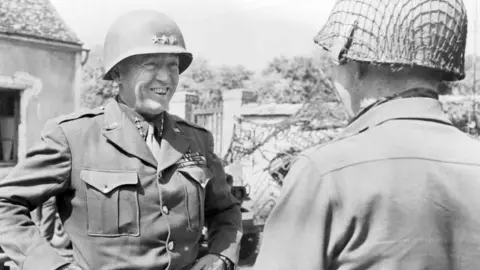 US Army Signal Corps
US Army Signal Corps"D-Day tomorrow. Everybody quite excited. We land at Arromanches, clear three villages and Bayeux."
Discovered in a dusty upstairs room of a pub, the matter-of-fact entry for 5 June 1944 written in block capitals in a small, pocket-sized diary by an unknown serviceman feels understated.
But for Phil Smith, the landlord of the Bells of Peover pub in the tiny Cheshire village of Lower Peover, it never fails to excite.
"Every time I look at it, I get goose bumps all over my skin," the 44-year-old says.
The framed diary, open on the page for 5 and 6 June, has pride of place in the dining room.
Next to it hangs a map of Normandy's beaches carved into sectors on which the British, Commonwealth and American troops would land.
As fascinating as both are though, it is the room in which they are housed that has the greatest significance, as it was within its walls that the US finalised their plans for D-Day.
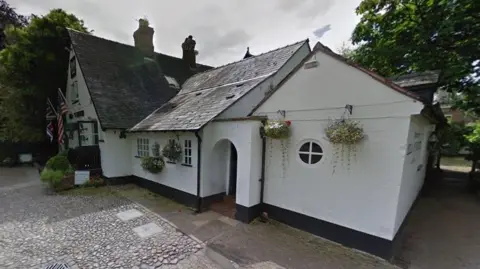 Google
GoogleIn spring 1944, Dwight D. Eisenhower, the future US president who was then supreme commander of the allied forces, and General George S. Patton ate together on two consecutive days.
Across those meals, they thrashed out plans for the Normandy landings.
Gen Patton, who commanded the vast US Third Army, had arrived in Lower Peover in January 1944 with his troops and had made nearby Peover Hall his headquarters.
His units would train nearby for their eventual deployment to France, a month after the 6 June landings.
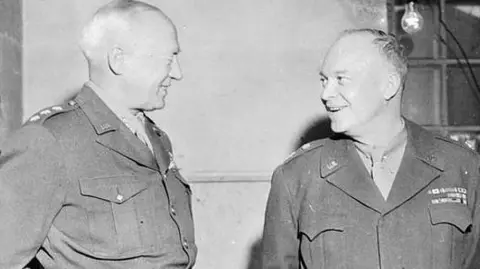 US Army Official Photography
US Army Official PhotographyHenry Brooks, 43, whose family has owned Peover Hall in Over Peover since the 1930s, says there are still traces of Patton’s time there.
He says tank tracks can still be seen on the ground between the Whipping Stocks pub and the country house, though the Nissen huts that lined the grounds are long gone.
He says his father Randle told him the Americans resurfaced one of the estate's roads and did "such a good job of it that he never had to resurface it once himself".
Reminders of the time are not just military though.
As a committed Christian, Gen Patton regularly worshipped at St Lawrence church in the grounds of Peover Hall and the US flag he presented to the clergy still hangs from its walls.
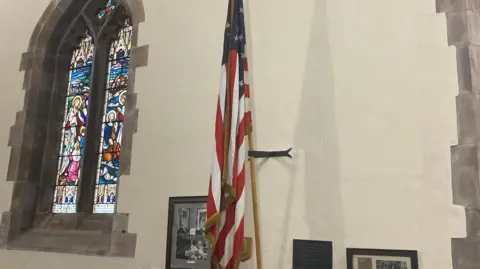
Born in California in 1885, Patton was a colourful figure, intensely popular with his men and famed for his rousing, expletive-riddled pre-battle speeches.
But it was that fiery rhetoric that almost cost him his place in D-Day history.
At a speech at the British Welcome Club for American Soldiers at Knutsford's Ruskin Rooms on 25 April 1944, he declared that it was "the destiny of the United States and Britain to rule the world".
A US senator wrote that the comment "succeeded in slapping the face of every one of the United Nations except Great Britain".
It earned Gen Patton a stiff rebuke from his superiors.
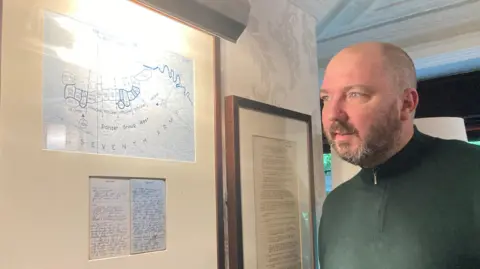
Nonetheless, the general's popularity remained and has continued to the present day.
The pub's dining room, aptly named The Patton, regularly hosts American tourists.
"They come down here on their way to the Lake District," Phil says.
"They’re all very keen to have their dinner in Patton’s dining room."
Hosting the general and his troops was far from Lower Peover's only contribution to the war.
In a nearby church, a small exhibition pays tribute to the locals who served int he conflict.
Sue Sullivan’s father Joseph Hunter enlisted on 15 May 1941, aged 33, and went on to become a second lieutenant in the 103rd Anti-Tank Regiment, Royal Artillery.
His unit landed on Sword Beach at 13:00 on 6 June, moving inland to Ranville and engaging in fierce fighting with the enemy.
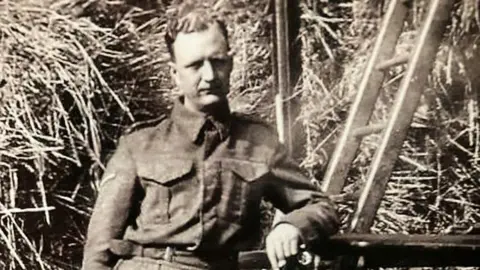 Family photo
Family photoThe 75-year-old says her father rarely talked about the war, despite being in the company of Lord Lovat’s Commando force and Bill Millen, the Canadian whose bagpipe-playing during the landings was immortalised in the 1962 film The Longest Day.
However, she says she believes he was proud of his service and for the part he played in helping young German women come to Cheshire after the war.
"They brought German girls over here to work as au pairs, because the Russians treated them very badly," she says.
"We had Margot, from Essen, who was living with us when I was born."
Some of these women settled in the area, while Joseph, whose service finished in 1946, became a furniture manager in a Manchester department store.
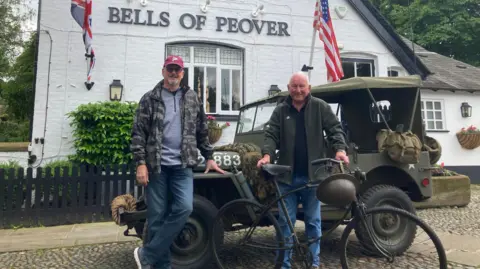
Andy and Ian Gough, whose father Sgt Geoff Gough is also honoured, can often be seen around the village in their 1942 Ford Jeep.
Stencilled on it is 3A 702, which stands for Third Army, 702nd Tank Battalion, the unit who become known as "Patton’s Troubleshooters", and the brothers like to imagine the general himself may once have been driven around in the vehicle.
Ian, 71, says their father’s service in France inspired their interest in the war.
Born in 1919, Geoff served in the 244 Battery of the 61st Medium Regiment, arriving in Normandy on 1 July 1944 with the task of hauling 25ft-long artillery pieces by tractor.
He demobbed in 1946 and lived in Lower Peover until his death, aged 90.
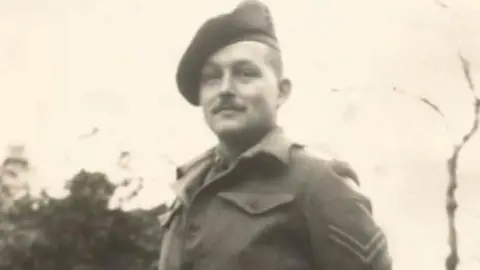 Family photo
Family photoAndy, 59, says it was only really when he and his brother started running veterans' tours to Normandy that they realised the significance of his service.
He says it stuck him that as his father went around his daily life, working and shopping, he "was just some little old man pushing a trolley round", but over in Normandy, he and his fellow veterans stood out.
"Back here, he would put the medals on and the beret and once a year have a march round Knutsford," he says.
"But that was it.
"When we took them there… they were superstars.
"It was amazing and I wouldn’t have missed seeing that for all the world."
Listen to the best of BBC Radio Manchester on Sounds and follow BBC Manchester on Facebook, X, and Instagram. You can also send story ideas to [email protected]
